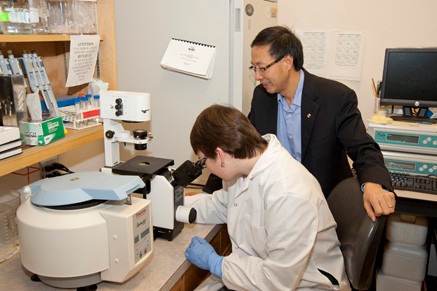Analytical and Environmental Toxicology

Divisional Director: Dr. X. Chris Le
10-102E Clinical Sciences Building
Edmonton, Alberta Canada T6G 2G3
Email: xc.le@ualberta.ca
Phone: 780-492-6416
Fax: 780-492-7800
Established in 2006, the Division of Analytical and Environmental Toxicology is a unique interdisciplinary program that offers exciting opportunities for training and research in areas bridging analytical chemistry, toxicology, and environmental and health sciences. Our diverse faculty hold several prestigious awards and some have joint appointments with the School of Public Health, the Department of Chemistry, and the Department of Physiology, and are affiliated with the Cancer Research Institute of Northern Alberta (CRINA) and the Women and Children's Health Research Institute (WCHRI).
Our students, postdoctoral fellows, research associates, and staff carry out cutting-edge research in the development of analytical and bioanalytical technology, biotransformation of environmental contaminants and therapeutic drugs, effects of emerging contaminants on human health, molecular mechanisms of effect, biomarkers, proteomics, and translational research. To enable the broad range of research, our laboratories are equipped with state-of-the-art analytical instrumentation, molecular biology tools, and cell facilities.
Our faculty members are recipients of a number of awards, including the NSERC University Faculty Award, Canada Research Chair, NSERC Steacie Memorial Fellowship, McBryde Medal, Maxaam Award in Analytical Chemistry, Ricardo Aroca Award in Analytical Chemistry, and Environment Research and Development Award. Our research projects are funded by external competitive grants and contracts.
Our students have received numerous research awards and scholarships, including the Vanier Canada Scholarship, Governor General's Gold Medal, Canadian Institute for Health Research (CIHR) graduate scholarship, Natural Sciences and Engineering Research Council (NSERC) graduate scholarship, and many provincial and university awards/scholarships. Many of our graduate students receive prestigious awards at scientific conferences for their outstanding research and communication.
We collaborate extensively with biochemists, microbiologists, molecular toxicologists, cancer and public health researchers, and industrial and government scientists. Our students, whose previous training may be in any area of basic sciences (chemistry, biochemistry, laboratory medicine, microbiology, pharmacology, etc.), benefit from cross-disciplinary collaboration, joint supervision, and access to advanced research facilities. Our graduates either pursue further research training or obtain employment in academia, government departments of environment and health, biotechnology and pharmaceutical industry, clinical laboratories, or environmental consulting firms.